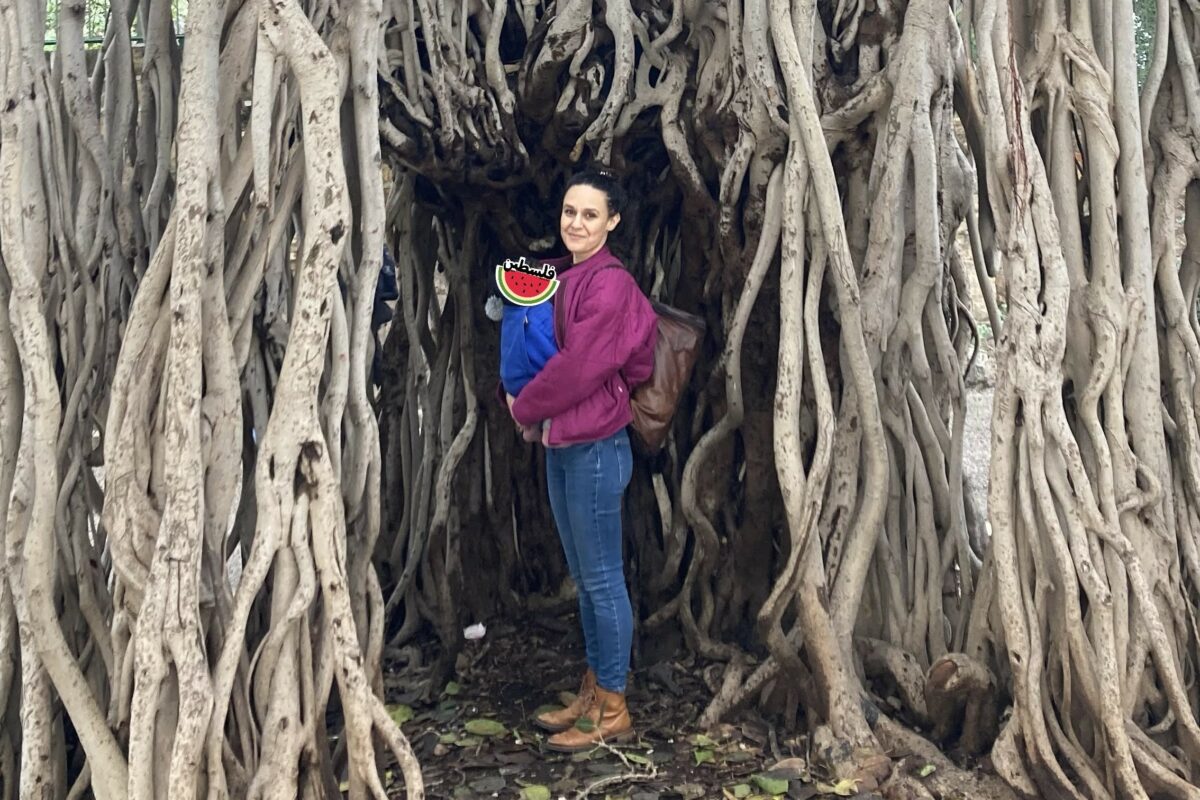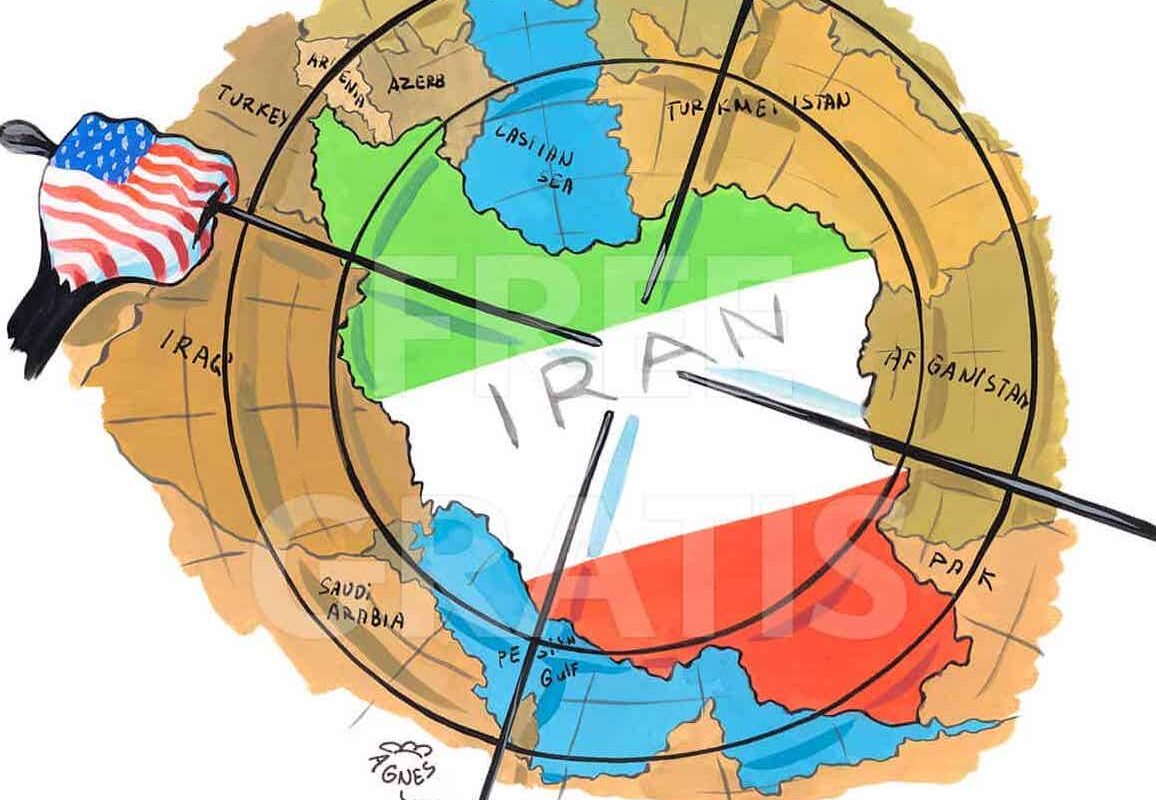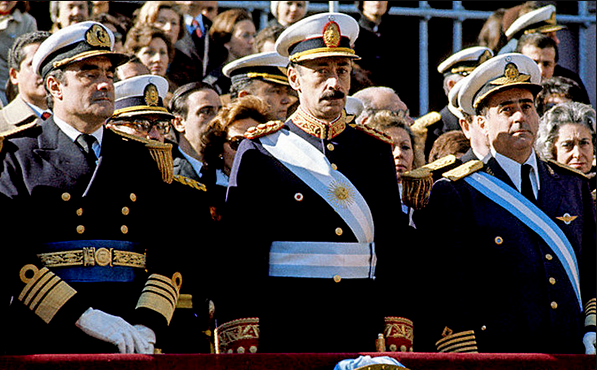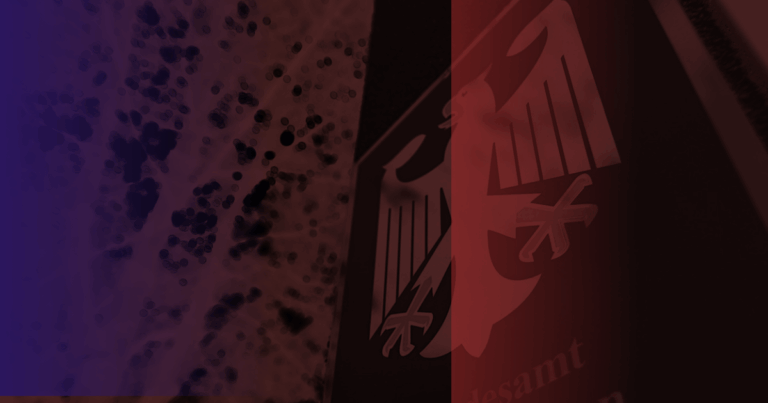Anna Younes (she/her) is a researcher who works with Race Critical Theories, Settler Colonialism and Psychoanalytic approaches. She finished her PhD in 2015/16, researching white German anti-Antisemitism seminars in Berlin, Germany, and mobilized the term “War on Antisemitism” for her theorization. Her work has moved on since then and keeps on developing. It can be found at www.annaestheryounes.net
How do you see Antisemitism as being instrumentalized to manage non-white migration in a white-supremacist Europe?
First of all, I think ‘race’ is being instrumentalized and weaponized, not ‘Antisemitism’ per se. What we are witnessing is a racializing and racist discourse, not a discourse about an actual Antisemitism, which is still very well and alive in Germany (and coming almost 90% from conservative forces and the far right). Plus, talking about “weaponizing Antisemitism” might easily fall – even if not intended – into actual anti-Jewish sentiments because it sounds, at least in semantics, as though it is Jews who are responsible for it. It would be more correct to speak about “weaponizing Whiteness” or simply “weaponizing race”.
Secondly, in my work I have been trying to connect what I call a “War on Antisemitism” to other counterinsurgencies such as the “War on Drugs” and the “War on Terror.” The War on Terror and the War on Antisemitism, instigated by imperial settler colonial global hegemons, both global (the USA) and regional (Israel), have been developing side-by-side. These state-funded, political counterinsurgencies operate by managing, and actively fighting, anti-imperial, anti-capitalist and anti-racist movements and individuals working to ‘decolonize’ the state and international capitalist system. Their strategies include surveillance, incarceration, targeted killings, war, repression of freedom of speech, restriction in migration and asylum politics and legal warfare – including revocations of citizenship. We see this panning out in full force all over the Western hemisphere with regards to Palestine these days for everyone to witness. Before, we have already seen it with regards to the War on Terror and the War on Drugs. The latter was launched to get rid of the rest of the anti-war left (Vietnam) and the Black revolutionary movements (Black Panthers and others) and obviously their continuous critiques of capitalism, after McCarthyism was already over. Furthermore, many laws with regards to money transfers etc. stem from these earlier counterinsurgency wars in supposed ‘post-colonial’ Western nation states as a response to political decolonization after WWII. These wars were always transnational and targeted populations inside and outside the Western nation state.
In what ways are police and state repression of pro-Palestinian activism in Germany rationalised with the transnational logic of securitisation and threats of political damage?
I would argue that the German state has turned the Palestinian into a transnationally operating figure of ‘terror’ and ‘antisemitism’. The figure of the Jew, which is the Janus-faced ‘other’ of said Palestinian and Muslim figures of terror and antisemitism, has been turned into a transnationally operating figure by European Christian Antisemites before.
Today, this transnational figure of the Jew is mobilized by the state and its elites yet again in the name of labouring for racial capital and security. However, this time the figure of the Jew acts as a ‘buffer zone’ and ‘racial frontier figure’ against the omnipotent and seemingly omnipresent figure of ‘Muslim terror’ and ‘Palestinian antisemitism’. In short, once the figure of the Jew was used to further Whiteness (Aryanness) in Germany by eliminating Jews, today the figure of the Zionist Jew is used to further Whiteness by getting rid of Palestinians and thus also Muslims, Arabs, Africans, refugees, etc. In other words, today’s frontier figure and fantasy of the ‘European Jew on the Brink of Extinction’ is mobilised by both old-school Antisemites and modern racists to labor on the racial frontier of capital and politics in Germany, on European borders and in Israel. Another uncanny moment is also that Germans are now becoming the better Jews, or rather Zionists. I used Rachel Dolezal as an example in a text of mine to compare said parasitic racial convergences, but a Dolezal for Jews and Germany. *laughs*
In short, while the transnationally operating racist figure of the Jew is used to argue for Europe’s self-defence, the transnationally operating Palestinian figure is used to argue an omnipresent terror and antisemitism, from which we need to protect the Zionist Jews. All other Jewish identities are not in need of protection by the state anymore either. That is why I argue to talk about Whiteness, Zionism included, as a political economic project and in this case also as a counterinsurgency.
How is a de-facto expulsion of pro-Palestinian perspectives from the arts taking place in Germany?
The arts are not special. But they are targeted after radical movements and public intellectuals have already been disposed of. In 2016, when Pary El Qalqili, Nadia Kabalan and I organised the first one-month-long, interdisciplinary and transnational Palestinian arts festival in Germany at Ballhaus Naunynstraße, called “After the Last Sky”, we were torn apart in the media. Back then, the media attacked us two weeks after the festival was over. The Israeli ambassador even accused us of having called for genocide (German: Volksverhetzung) – he wasn’t even at the festival *laughs*. During that time, the tabloids and newspapers called for ‘political background checks’ of curators and argued that state funding shouldn’t be given to Antisemites. In many ways, what they set the stage for back then with us is absolutely normalized in Germany today. Some people call this political climate a ‘New McCarthyism’ and I see the point they are trying to make. But I also think that this framing leaves out repression in colonial systems: being politically ‘cancelled’, surveilled and having the masses misinformed about your political goals is a colonial tool. It has also been going on for a long time for people of colour in the West, or Jews in a still colonial Europe.
People call this a “New McCarthyism”….?
‘McCarthyism’ came shortly before US American apartheid (Jim Crow) was finally over, in a time where new trade relations were formed in the name of continuing imperialism. This also demanded change in political relationships along with an ever more critical white Western elite. McCarthy came as a response to these political changes, the radicalization of movements and public intellectuals against US American economic imperialism at home and abroad. But the tools he and his people used were colonial; the goal was to continue colonial imperialism in a seemingly new polit-economic system. That’s why I would call it simply colonial. But maybe the European bourgeoisie understands ‘McCarthyism’ better. In many ways it’s worse, in fact: if this was McCarthyism we would all have political show trials, televised “hearings”, and people could watch us being tried *laughs*. I mean it was a big political performance back then meant to intimidate. Today, we are rather “disappeared” from public debate! People usually don’t even hear about us, or know that the bank account of Jewish Voice for Peace in Germany has been cancelled for the third time now, if I am not mistaken. That’s why I think it’s different to McCarthyism. It’s colonial. Interestingly, Chinese artist Ai Weiwei compared what is going on in the West to the “Cultural Revolution” under Mao in China, rather. The only McCarthyite mirroring I can see are the recent Congressional Hearings in the USA against the Columbia University president, for instance, and many of its professors. It seems the record of education shall be cleaned from Palestinian history and resistance?
How do you understand the ideological erasure of Palestine in German speaking academic environments?
I would say that settler colonial theories offer us the tools to understand the eviction from our constitutional “homes” as the dispossession of our spaces and rights: the moving around of populations, or else their elimination, to maintain the homogeneity of a polis in the name of dominating territory, politics and thus also an economy is settler colonial. In this scenario and others obviously, academia is also the site where the elite of a state, as well as its globally operating capital interests, are educated and created in the service of reproducing and maintaining said structures and interests. Plus, Academia is already very precarious: one labours a lot today, is full of knowledge, and the market is so saturated that institutions go for politics rather than content. If certain radical critiques aren’t marketable and consumable enough, they won’t make it into the academic structures, especially not in a political economy where there is less and less money for the humanities and social sciences.
Evicting Palestinians qua Palestinian politics from public debate in Germany is part-and-parcel of the “New Germany”, or else, the New German Nationalism. In other words, one can assimilate and “stop publicly” being Palestinian and then you can be, conditionally, tolerated. However, evicting Palestinian politics through the Palestinian body from this national territory is foundational to keep the ‘peace’ in the reproduction of the system otherwise we would need to talk about its immanent political economy, its colonial history and its colonial legacies. These liberal notions of ‘peacekeeping’ and ‘European freedom of education’ are precisely how liberal colonial politics are used as counterinsurgency tools today.
Can you give us an example?
Sure, on October 12th, the Conference of the Federal Ministers for Culture (Kultusministerkonferenz) convened urgently. Following the meeting, on December 12th, 2023, the ministers issued a damning statement laying out a blueprint for the future at German Universities. The governing body of the National Ministry for Education and Research (BMBF) has sworn allegiance to this statement and follows suit in its programmatic approach. In a 10-point-programme, the document declares its unconditional solidarity with “Humans of Jewish Faith” (“Menschen Jüdischen Glaubens”) and “Israeli Citizens”, and stands against all Antisemitic and anti-Israeli incidents that have happened on campuses. Again, all Jews are understood as Zionist, and non-Zionist Jews become the target of these managerial moments, where once the Nazis already declared to define what Jewishness and Judaism means.
Here, the ‘racial frontier’ logic unfolds unashamedly: the document calls for securing peace and order at Germany’s universities with the purpose of ensuring an environment of “carefree study, research, and discussion”. While citing the IHRA definition as a mandatory and much needed guide for universities, the text also openly calls for minority management in Point 7, by moving from the IHRA-definition as quasi-law to its treatment as actual German law.
What is euphemistically called “effective case-management” on page three, essentially calls for a ‘by all means possible’ approach to be used as offered by the “rule of law” as well as by investigations by the university itself. After Point 6 has already established that “universities are sites of freedom”, the Janus-faced other side of modernity thus requests to review “security concepts, establish a close exchange with the security authorities in the event of threats and strengthen security precautions where necessary.” (“Action plan against Antisemitism and Israeli-hatred,” Kultusministerkonferenz, December 7th, 2023, p. 3) The list goes on, obviously, and that is just one of the many examples.
In a recent academic blog posting, you speak about the dehumanisation of Palestinians by their representation as ‘human animals’. What does this mean for ideas of settler colonialism?
So, in this piece, I am arguing that the cutting of land, animals and humans into pieces in the name of the reproduction of capital is driving settler colonial interests, with a particular focus on ecology and the non-human. Furthermore, in this and another piece I am arguing to start thinking from “death worlds” and the “walking dead”. I was happy to hear that Prof. Nadera Shalhoub-Kervokian is thinking the same in terms of “cutting people into pieces” when it comes to the Israeli settler colonial regime.
It was settler colonialism – aka, the conquest of the Americas or the inner-Asian slave trade of the Dutch for instance; the dispossession, enslavement and/or channelling of millions of Indigenous peoples to Europe, the Caribbean, or places like the Azores or Madagascar; the institutionalisation of racial slavery by the 16th and 17th century on plantations in the Americas, etc. – it was settler colonialism which facilitated the emergence of what we today call capitalism, not simply ‘colonialism’.
I am thus calling for us to broaden our lenses when we speak of settler colonialism, that we understand it through the optics of land, animal, and plant life as well. In this way, it becomes understandable why Indigenous folk would often be metaphorized as plant life, black people as ‘chattel’, Jews as ‘vermin’ by the Nazis, and Palestinians today as ‘human animals’ or ‘cockroaches’ by Israelis. In this piece, I argue that we should look beyond the optics of the ‘human’ and ‘dehumanization’ as its dialectical opposite. By this I mean that these liberal, and otherwise colonising ideologies, that demand to bring people of colour, indigenous people and black people back into the fold of ‘humanity’ – or at least grant them political or legal access to the concept of the ‘human’ – need rethinking. I would argue that there is so much more to decolonize than simply asking for humanity to be granted to the Global South, or to people of color. There is more on this planet than the human – one might call this obsession with the human a ‘speciesist-approach’. So, there is so much more to decolonize than just what we understand as ‘the human’, as well as to understand ‘the human’ through other optics, namely the planet, animals, plant life. We need to think more radically to save humanity writ-large.
Looking beyond the optics of the human also allows us to understand why cutting animals, land and humans into pieces is necessary for the production of capital to function and reproduce itself. Let us think here of Congo and King Leopold II, who literally cut people and land into pieces. Let us think also of the hanging of Latino and Black people in the States, where onlookers and those holding barbecues around it often left those spaces with body parts as souvenirs and postcards of the event were circulated to Europe. This is not dissimilar to what we see on social media with Israeli soldiers parading their deeds in public and on social media today.
How do you view the reciprocal relationship between academia and activism?
I’m not sure what you mean by “reciprocal relationship” between academia and activism? Do you mean if it ever existed on equal terms? I know many people who work on race and racism or colonialism in German academia who are incredibly silent these days even if they have full professorships. In Germany, I get the sense that academia looks down on activism as polemic, fast-moving, non-thinking…etc. … most of the time, not all the time. It’s definitely frowned upon to be a “scholar-activist”. And as a response, activists often look down on academics. I believe that activism, scholar-activism or solely activism, especially in Germany, might benefit in this subject if it became more transnational in its lens, just like the formations of capital have always been.
Furthermore, as long as we think that Germany is the worst devil in the repression of Palestinians in activism or academia, we are missing the most important points: That A) this is not just about Palestine, but also about Standing Rock and Ferguson, about Congo, about Yemen and Kashmir. B) We need to follow the supply chains of capital interests (the weapons, AI technologies, oil and gas) and the Christian Zionists with money and particular moralities that are effecting way more people than just Palestinians, and C) we need to take seriously the analysis of the transnational and transhistorical structures that made all this possible. After all, the techniques aren’t new, and what’s happening in Palestine isn’t new either. Finally, we need to discuss and further theorize D) the transnational and transhistorical workings of settler colonialism which trap Palestinians between civilian violence and state violence. These might be extreme in Germany within Europe, but they are not confined to it – in the USA people were literally shot! E) It’s really important that we do not “re-center” Germany, yet again, via arguments of “exceptionalism”. That’s what the state does already quite well. *laughs*
What role does anti-Muslim racism play in the Palestine discussion in Germany?
The ‘War on Antisemitism’, as well as the ‘War on Terror’, can only happen within the context and structures of white supremacy – which are, in our current moment, very much structured also by anti-Muslim racism. In this way, the ‘War on Antisemitism’ and the ‘War on Terror’ give further grounds onto which anti-Muslim racism unfolds. Even if you “just” talk about “anti-Palestinian racism”, it is anti-Muslim racism specifically which is the backdrop against which it is articulated. But then again, no racism exists in isolation, since race and racism change according to time and economic and political needs and cannot be given only one particular definition. Meaning, in our example, anti-Muslim racism changes and is defined constantly in relation to anti-Jewish racism, anti-Black racism, anti-Roma/Sinti racism, and so on. Context, economy and time matter.
If racisms get a lot of attention in politics and are defined in one particular way only, then this usually serves a political goal: The IHRA definition is a good example. It has sealed and institutionalised the racial contract by making it possible for nation states, European institutions and a non-Jewish, white majority and its elites – here in particular also in Germany of all places – to be the targets and victims of Antisemitism. How ironic! The “War on Antisemitism” uses IHRA as a tool in this counterinsurgency to invert anti-racism discourses entirely: that is how the powerful victimise themselves, and the victims are portrayed as those with omnipotent powers that have come to destroy Western peace, and civilization. The level of fear-mongering, misinformation and indoctrination, alongside the willful embrace of all of it, are dangerous and scary.
Could you speak about the Eurocentrism of likening the genocide taking place in Gaza to the Holocaust?
Well, I think it is quite dangerous to make mass violence, racism, and genocide only legible, understandable and speakable when referring to WWII and European politics – past and present. It speaks again to the fact that if it’s not understood through a European or white-centric narrative (from the Holocaust to McCarthyism) it isn’t legitmate enough to be named as “atrocity”, injustice, repression, genocide or what have you. It seems that we need to take this epistemological “European detour” – at least in discourse and rhetoric – to make our arguments legitimate. That’s sad. It’s also extremely dangerous, because it demands again a European lens to understand what is currently happening as ‘crimes against humanity’, genocide or war crimes.
Imagine if we took Leopold’s Congo, the British starvation of the Indian population, or the killing and resettlement of indigenous people as a reference point. Maybe people wouldn’t even understand these links, simply because they might not know the histories, let alone condone said statements as legitimate grievances and arguments for what is happening today in Palestine.
Can suffering be made palpable and consumable without reference to European history in Europe? It rather seems as though only Europe and Eurocentrism make knowledge of atrocities possible. What about all those mainly colonial and settler colonial atrocities that are not condoned by Europe, that are not taught as national histories, and that are not even spoken about? Have these not been atrocities and genocides? Do I need to refer to the Holocaust to make the understanding of Palestinian suffering understandable? Isn’t that, again, linking Palestine to German Nazi Antisemitism, in yet another liberal way that will eventually bite us in the bottom and keep us within the same eurocentric logics? That’s the problem with Eurocentrism.
Instead of understanding today’s Palestine as a reference to the afterlives of the Holocaust – through a eurocentric lens, which is historically and factually incomplete – we need to understand Palestine through the prism of European settler colonialism, where it was common to transfer people elsewhere to solve political problems at home, kill them or pretend – even if only in fantasy – that they do not exist (anymore). If we fail to do so we continue to serve European interests and its concomitant “memory politics”.
Does your work receive attention in Germany?
I wouldn’t say so. But again, if one is able to speak to a broader public as a Palestinian one is either the black cat in the matrix and vanishes very quickly again *laughs*, or else one already endorses the politics of the state, like Ahmad Mansour or liberal critiques that still praise Germany for its migration politics or its ostensible “lessons from the past”. And then, let’s not forget that being a woman talking politics is also not easy. Hence, being allowed to speak as a Palestinian in and from Germany in general says more about the politics you embrace than about whether your work reflects what is going on or not. Until the 2023-genocide started people who would have more power to shape public discourse on such matters were more interested in talking about German commemoration of Nazi-Antisemitism and memory politics, than about war and warring economies, settler colonialism, counterinsurgencies, and race in and beyond Europe. Although that’s all related, some people position these two fields as non-related.
I think a lot of Palestinians here have the feeling of being invisible with our work, while being hypervisibilized as victims or agents of terror/antisemitism when it comes to us being torn apart in the media, or being barred from certain jobs or, as in Palestine, even barred from life. So this invisibility-hypervisibility-binary is nothing special I would say. That’s simply colonialism, many people are affected in the same way. That’s all I have to say.
Thank you very much for your interest in my work and your time!




